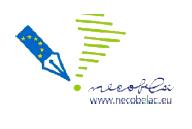Services on Demand
Journal
Article
Indicators
-
 Cited by SciELO
Cited by SciELO -
 Access statistics
Access statistics
Related links
-
 Cited by Google
Cited by Google -
 Similars in
SciELO
Similars in
SciELO -
 Similars in Google
Similars in Google
Share
Revista de Salud Pública
Print version ISSN 0124-0064
Rev. salud pública vol.13 no.6 Bogotá Nov./Dec. 2011
NECOBELAC supporting Open Access, a path to open science

On the occasion of the International Open Access week, a global event now in its 5th year, promoting Open Access (OA) as a new norm in scholarship and research, we, the NECOBELAC (Network of collaboration between Europe and Latin American Caribbean (LAC) countries to spread know-how in scientific writing and provide the best tools to exploit open access information for the safeguard of public health) project partners, wish to stimulate the scientific community to take action and make their work open access to disseminate free health information worldwide.
NECOBELAC is one of the many initiatives in support of OA; it is a project involving European and Latin American and Caribbean institutions to promote the diffusion of health information through a training programme, addressed to different stakeholders, aiming to improve scientific writing skills and create awareness on the OA publishing models (www.necobelac.eu).
OA to scientific publications has been consolidating as an international movement on the last decade, promoting the idea that scientific knowledge is a public good and OA represents a fair solution to account for publicly funded research. Yet, the potential of OA is far from being realized and lively debate is still persisting among stakeholders about the economic sustainability of the model due to the high charges for article publication and legal restraints. In spite of this history, there is still limited take-up of OA by researchers and some feel uncertainty about how OA will be funded. These doubts are hindering progress.
How much research is democratically accessible at a global level? It has been estimated that currently, only about 20 % of all articles are available in OA, about 8 % in OA journals (the golden road) and 12 % in repositories (the green road). These low figures are probably due to the lack of awareness about OA benefits and the available solutions to the barriers authors and institutions may come across in making their work OA. However, OA uptake and OA infrastructure continues to grow.
The number of repositories has been growing steadily in the last 5 years (from 700 in 2006 to more than 2,100 repositories in the Directory of Open Access Repositories).The distribution of repositories worldwide closely follows the volume of scientific output, with 68 % of the repositories established in Europe and North America, 17 % in Asia, and almost 7 % in South America. In order to encourage the self-archiving of publications into repositories, policies and legislation have been established in several countries.
Since the Budapest, Berlin and Bethesda Declarations in favour of OA, in 2002-2003, there was an immediate increase in OA journals. To date, the Directory of Open Access Journals registers 7,144 journals in 116 countries. OA journals prevail in emerging regions, particularly Latin America with good quality OA journals, such as those published by the SciELO program. As regards public health research in Latin America, the golden road has been prevailing, and the number of OA repositories has also been growing at a rapid pace in recent years.
The challenge now is to foster the global cultural change towards a really open dissemination of health research results by including also raw data and metadata, source materials, digital representations of pictorial and graphical materials and scholarly multimedia material.
We are committed to build up a path towards open science and ask you, as producers and users of health information, to support the wider dissemination of information resources to build up and consolidate a closer link between knowledge and public policies for the wellbeing of the world's population.
- Istituto Superiore di Sanità (Italy): Paola De Castro, Daniela Marsili,
Elisabetta Poltronieri.
- Consejo Superior de Investigaciones Científicas: Remedios Melero;
and Universidad Nacional de Educación a Distancia: Alicia Lopez-Medina
(Spain).
- The University of Notthingham (UK): Bill Hubbard.
- BIREME/PAHO/WHO (Brazil): Pedro Urra, Lilian Nassi Caló.
- Instituto de Salud Pública. Universidad Nacional de Colombia: Carlos
Agudelo
- Universidade do Minho (Portugal): Eloy Rodrigues, José Carvalho












 text in
text in 


